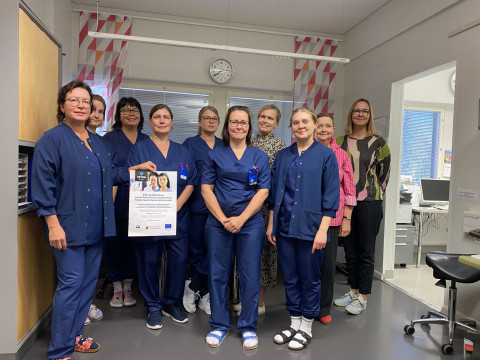Nurses with immigrant backgrounds can provide much-needed relief to the nursing shortage in Finland. At the same time, workplaces in healthcare need a deeper understanding of concepts such as cultural sensitivity. The TRACTION training project, called VETOA in Finnish, develops tools and operational models to support attractive and sustainable multicultural work environments.
The two-year TRACTION project (short for Attractive Multicultural Work Environment in the Wellbeing Services County of North Savo) implemented by the Department of Nursing Science, the School of Humanities, and the Centre for Continuous Learning at the University of Eastern Finland is funded by the European Social Fund Plus (ESF+). The project's training sessions and workshops involve staff from the North Savo Wellbeing Services County and Attendo, a private-sector service provider, specialised in services for older people.
“The goal is to promote the integration of nurses with immigrant backgrounds into Finnish workplaces in healthcare, strengthen the cultural sensitivity skills of work communities and leaders, and support organisations in the growing nursing shortage. The content is designed to meet participant needs to best support the practices of, and changes experienced by, work communities,” says Project Leader, Professor Tarja Kvist.
The employment challenges of nurses with immigrant backgrounds are often related to language skills. Introducing individuals from different backgrounds into the work community requires responsiveness and continuous learning. In a multicultural, multidisciplinary and multilingual work community, all parties also need cultural sensitivity – the ability to understand, respect and consider the values, beliefs and practices of different cultures in interactions with others.
To meet these needs, the TRACTION project offers study modules for both native Finnish speakers and employees with immigrant backgrounds, as well as their supervisors.
Learning online and in the workplace
“We have developed study modules on cultural sensitivity and multilingualism, and during the project, we will also create a model for collaboration and operation that is culturally sensitive, and a digital learning platform for knowledge dissemination. These tools will enable work communities to independently develop their operations even after the project ends,” says Krista Jokiniemi, Project Manager for the TRACTION project.
The training materials include digital learning materials and tools, lecture recordings, podcasts and online platforms that support flexible, time- and location-independent study.
“Additionally, some study modules include in-person teaching in work units. This provides students with the opportunity to receive personal guidance and deepen their learning in a practical environment,” says Project Coordinator Hanna Rouvinen.
The common self-study course "Multicultural Collaboration in Healthcare" (3 ECTS) for all participants started in October 2024 and is intended to be later opened as a MOOC online course for everyone interested. It addresses themes related to multiculturalism, language awareness and consideration of cultural differences, which are essential in workplaces in healthcare and in client and patient work.
Upon hearing about the project, Nurse Manager Seija Hämäläinen signed her department up for it. “We had been informed that we would be getting nurses through the international recruitment service of the Wellbeing Services County, and I thought the project would help us in this process. This provided nurses with the opportunity to learn new things alongside their work without any additional costs.”
Nearly all nurses from the department signed up for the courses available through the project, and many quickly completed the first course on multicultural cooperation. The second course, English Language and Multilingualism in Healthcare (4 ECTS), has also begun. “It also includes in-person teaching, i.e., specific days when the teacher comes here, to our workplace.”
“Although enabling participation in the project’s courses requires some extra work from the nurse manager, it’s nice to see how the studies bring more energy and variety to the demanding day-to-day work. My guess is that some of my best people will get so excited about studying that they’ll later pursue studies at the University of Eastern Finland,” Hämäläinen notes.
“The TRACTION project was initiated to address the needs of the Nort Savo Wellbeing Services County, and it is gratifying to hear that it is perceived as providing concrete tools and support for challenges in the workplace brought by international recruitment. It is exciting and motivating to work in collaboration with work communities on this important topic,” says Jokiniemi.
In 2025–2026, workshops will also be organised for the units participating in the project. The staff of the units will jointly define the needs of the workshops, i.e., what kind of joint activities or development is needed on the themes of multicultural cooperation. The workshops also aim to create pleasant, shared moments and strengthen community spirit. Finally, there will be a joint conference for all participants. The project ends in June 2026.

For further information, please contact:
Project Manager Krista Jokiniemi, krista.jokiniemi@uef.fi, tel. +358 50 512 7902
Project Coordinator Hanna Rouvinen, hanna.rouvinen@uef.fi, tel. +358 50 304 2829
TRACTION project website and project staff
Listen to or read the first episode of the VETOA podcast – the topic is cultural sensitivity in everyday encounters (in Finnish, with English transcript)
Read the blog post about the implementation of the VETOA podcast (in Finnish)

